Diplomatic Bluebook 2021
Chapter 2
Japan's Foreign Policy by Region
3 China / Mongolia, etc.
(1) China
A Situation in China
(A) Domestic Affairs
The Third Session of the 13th National People's Congress (NPC) was originally scheduled for March, but was postponed due to the impacts of COVID-19 and held in May. As the impacts of COVID-19 drew attention, Premier Li Keqiang said in the Government Work Report at the session that “We have resolutely won the battle to protect Wuhan and Hubei, and we have achieved decisive results.” From October 26 to 29, the fifth plenary session of the 19th Communist Party of China (CPC) Central Committee was held, and the “14th Five-Year Plan (2021-25) for National Economic and Social Development and the Long-Range Objectives Through the Year 2035” were deliberated and adopted. President Xi Jinping was described as the “core of the Central Committee of the Party” and as the “core of the whole Party,” and the leadership of the CPC and the superiority of the socialist system were re-emphasized. In addition, 2020 was the target year for the realization of building a “moderately prosperous society” and it was mentioned that “victory is imminent,” showing confidence that the eradication of poverty would be achieved as planned by the end of the year. In December, President Xi Jinping stressed that China had “lifted nearly 100 million people out of poverty and won a significant victory that impresses the world,” and declared that the goal of “zero poverty” had been achieved by its deadline of 2020.
With regards to Hong Kong, the large-scale protests that had been ongoing since 2019 decreased in conjunction with the spread of the COVID-19 epidemic. Meanwhile, in May, the Standing Committee of the NPC enacted the Hong Kong “National Security Law,” and decided to apply the law to Hong Kong. In response to this move, in a G7 Foreign Ministers' Statement in June, in which Japan also participated, the Foreign Ministers stated that China's decision is inconsistent with the Hong Kong Basic Law and with China's international commitment under the principles of the legally binding, UN-registered Sino-British Joint Declaration, and expressed grave concern that the law could undermine the principle of ‘One Country Two System' framework in Hong Kong. However, despite the concerns of the international community and of Hong Kong citizens, on June 30th the Standing Committee of the NPC enacted the Hong Kong “National Security Law,” which stipulated four types of criminal acts to be added, including separatism from the state, subversion of state power, terrorist activity, and colluding with foreign countries or powers and harming national security, and it entered into force on the same day. Since then, Hong Kong's democratic activists and media officials have been arrested based on the law, Hong Kong legislative elections scheduled for September were postponed, Hong Kong Legislative Council members were disqualified based on decisions from the Standing Committee of the NPC, and all pro-democracy members of the Legislative Council resigned in protest of this. The international community, including Japan, has repeatedly expressed grave concerns about the situation in Hong Kong. The Consulate-General of Japan in Hong Kong, the Japan External Trade Organization (JETRO) Hong Office and the Hong Kong Japanese Chamber of Commerce & Industry conducted the “Fifth Survey on the Business Conditions Surrounding Hong Kong” (October 19) targeting full members of the Hong Kong Japanese Chamber of Commerce & Industry, members of the Hong Kong Japanese Restaurant Association, and members of the Hong Kong Wakyokai. 66.8% of all respondents answered that they were “Extremely concerned” or “Concerned” about Hong Kong's “National Security Law.”
The international community continues to express high interest in the human rights situation in the Xinjiang Uygur Autonomous Region (XUAR). At the UN Human Rights Council in June and the Third Committee of the UN General Assembly in October, joint statements were read out expressing grave concerns about the human rights situation in the XUAR and in Hong Kong, and calling for meaningful access to the XUAR by the UN High Commissioner for Human Rights. Japan participated in both statements as the only participating country from Asia. Japan is seriously concerned about the human rights situation in the XUAR, and believes that it is important for China to guarantee the universal values of freedom, respect for basic human rights and the rule of law in the international community. As the international community including Japan has been expressing increased interest and concern over the human rights situation in the XUAR, Japan is working at all levels, including when State Councilor and Foreign Minister Wang Yi visited Japan in November 2020, to have the Government of China provide transparent explanations on the issue.
(B) Economy
Due to the spread of COVID-19, China's real GDP in the first quarter of 2020 decreased by 6.8% year on year, the first negative growth rate since 1992, the furthest back that quarterly statistics are available. Production, investment and consumption from January to March all saw negative growth for the first time in the quarter, and exports fell sharply due to a decrease in overseas demand, with COVID-19 having a serious impact on China's economy. After the first quarter, the Government of China called for an early resumption of economic activities while curbing COVID-19 through means such as tracking users' behavior and movement history via apps, etc. The economic recovery progressed, driven by production, investment and exports, and the real GDP for 2020 increased by 2.3%.
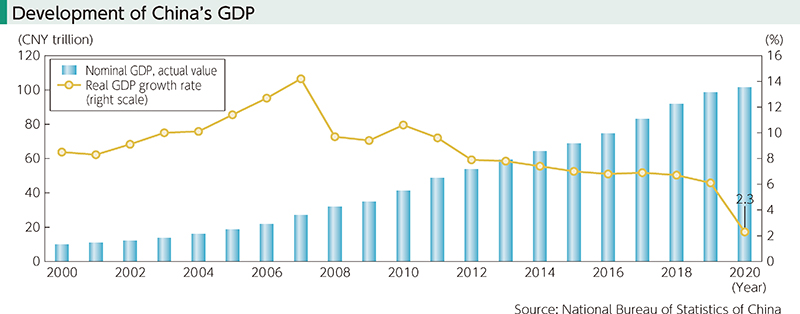
At the 13th National People's Congress held in May, Premier Li Keqiang set the main development goals for 2020 as stable employment, poverty alleviation, industrial upgrading and the expansion of domestic demand. On the other hand, a target economic growth rate was not presented because of the unpredictable effects that China's development was facing due to uncertainty over COVID-19, the economy and trade.
At the 5th plenary session of the 19th CPC Central Committee held in October, in addition to the proposal of the 14th Five-Year Plan (2021-25) for National Economic and Social Development and the Long-Range Objectives Through the Year 2035, the need to enhance economic self-sufficiency, including a shift to a domestic demand-led economic structure, was emphasized along with the construction of supply chains that are not affected by foreign pressure and the strengthening of science and technology for “independence,” “self-reliance” and “ensuring the security of the national economy.” At the 4th session of the Standing Committee of the NPC held in March 2021, the proposal was specifically established as the 14th Five-Year Plan (2021-25) for National Economic and Social Development and the Long-Range Objectives Through the Year 2035.
In the drafting process of this proposal, General Secretary Xi Jinping gave an address at an internal meeting in April entitled “Major Issues Concerning China's Strategies for Mid-to-Long-Term Economic and Social Development,” in which he laid out a new development strategy of establishing autonomous domestic circulation while further expanding the 400 million people in the middle-income group, attracting resources from all over the world, attracting international industrial chains to have dependent relationships with China, and maintaining the policy of putting China first in the real economy, such as in the manufacturing industry (this address was published in the Party's magazine, “Qiushi,” in October).
As for foreign economic policy, it was stated that China will continue to open up to the outside world. In November, the Third China International Import Expo was held, and in terms of economic partnerships, the Regional Comprehensive Economic Partnership (RCEP) Agreement for East Asia was signed and at the end of December a general agreement was reached on the EU–China Comprehensive Agreement on Investment. Additionally, President Xi Jinping, with regards to the Trans-Pacific Partnership (TPP11 Agreement), stated that he would “favorably consider” joining it at the APEC Economic Leaders' Meeting in November.
At the Central Economic Work Conference held in December, it was stated that 2020 was a very special year in the history of the new China, as China was the only country in the world that achieved positive economic growth, that the main goals and missions of the 13th Five-Year Plan would soon be completed, and that achieving total completion of a “moderately prosperous society” was imminent. In addition, the following were set as priority tasks for economic policy in 2021: (1) strengthening strategic science and technology capabilities, (2) industrial policy (strengthening industrial chain and supply chain control, etc.), (3) expansion of domestic demand, (4) reform and opening up (favorably considering joining the TPP11 Agreement, etc.), (5) agricultural and food policy, (6) competition policy (strengthening antitrust and preventing the disorderly expansion of capital, etc.), (7) housing policy, and (8) environmental policy (peak out carbon dioxide (CO2) emissions, concrete measures to achieve carbon neutrality, etc.)
In order to manage the party and administration stably, it is necessary to ensure constant economic growth while handling all domestic and external issues, and it is worth paying attention to the trends of China's future economic and financial policies.
(C) Response to COVID-19
COVID-19 spread from China to the rest of the world after the end of 2019. On December 31, 2019 China reported a pneumonia of unknown cause to the WHO office in Beijing, and it was additionally reported on January 3, 2020 that 44 people had contracted pneumonia of unknown cause. On January 16 it was announced that there were a cumulative total of 41 people who had been infected. Additionally, on January 3, a Wuhan doctor who posted on social media about an epidemic of pneumonia of unknown cause was punished by the Wuhan police authorities.
On January 20, President Xi Jinping gave instructions to resolutely stop the spread of COVID-19. On the same day, Zhong Nanshan, Head of China's COVID-19 Expert team, said in a television interview that “There is certainly human-to-human transmission.” Following this, the cumulative number of infected people announced by the Government of China was 291 on January 20 and 11,791 on January 31.
On January 23, the Government of China took steps to seal off the city of Wuhan. Meanwhile, the mayor of Wuhan said on January 26 that more than five million people had already left Wuhan (the population of Wuhan is approximately 11 million).
President Xi Jinping established the “The Central Leading Group for COVID-19 Prevention and Control” on January 25, it held its first meeting the following day on January 26, and full-scale infection prevention measures began. On January 27, an order was issued to cancel all overseas group tours. On January 28, WHO Director-General Tedros visited China, met with President Xi Jinping, and on January 30 the WHO issued a “Public Health Emergency of International Concern.” The number of infections in China exceeded 80,000 in March, but the spread of the infection began to subside from mid-March. On March 10 President Xi Jinping visited Wuhan, on March 12 the Chinese health authorities announced that the peak of the infections in China had already passed, and on March 18 the number of new infections in China went to zero for the first time.
(D) Foreign Policy
In 2020, amidst the worldwide spread of COVID-19 from China, China has been actively expanding its external support since March. In June, the State Council Information Office of China published its first white paper on COVID-19, “Fighting COVID-19: China in Action.” The white paper mentioned that by May 31 China had dispatched teams of medical professionals to 27 countries and had provided medical supplies, such as masks, protective clothing and ventilators, to 150 countries and four international organizations. Additionally, China actively promoted the domestic development of vaccines and steadily improved its vaccine production systems. At the annual WHO meeting in May, President Xi Jinping announced that, after putting its vaccines into practical use, China would make them a “global public good.” Additionally, China actively used its vaccines for foreign policy, such as by promising Chinese-made vaccines to Southeast Asia, Africa and others.
Continuing from 2019, the U.S. and China are confronting each other in a variety of fields, such as trade issues, competition for advanced technologies and COVID-19 response from March, and made frequent criticisms of and sanctions toward each other on multiple fronts, including politics, foreign policy, military and security, the media and education. In the U.S. Congress, as there were increasing calls for measures including strict sanctions against China, the “Uyghur Human Rights Policy Act of 2020” in June and the “Hong Kong Autonomy Act” was enacted in July, and regulations on many Chinese companies were tightened due to security concerns and other reasons. The U.S. closed the Chinese Consulate-General in Houston at the end of July, claiming that it was a base for espionage and intellectual property theft, and in response China closed the U.S. Consulate-General in Chengdu. Furthermore, in January 2021 the U.S. determined that the human rights situation in the Xinjiang Uygur Autonomous Region (XUAR) was genocide. In March 2021, the U.S., EU, UK and Canada announced sanctions for human rights violations in the XUAR. In response, China announced countersanctions against the U.S., EU, UK and Canada. As establishing stable relations between the U.S. and China, the first and second largest economies in the world, is an issue not only for Japan, but also for the international community as a whole, Japan will continue to monitor future developments.
(E) Military Affairs and Security
China has been increasing its defense expenditures about 44-fold over the past 30 years, but the breakdown of the budget and the intention behind the increase have not been disclosed sufficiently. Under such circumstances, China is extensively and rapidly enhancing and modernizing its military power centered on its nuclear and missile capabilities and naval and air forces. It is placing importance on ensuring its superiority in new domains of outer space, cyberspace and electromagnetic spectrum. China's expansion of military capability lacking transparency, unilateral actions to change the status quo in the East China Sea and South China Sea, and the expansion and increased vigor of its military activities are strong security concerns in the region, including Japan, and in the international community. China has been demonstrating a proactive stance in continuing to take an active part in United Nations PKOs as well as providing various kinds of humanitarian aid and disaster support, etc.
At the 19th Party Congress (2017), President Xi Jinping stated that China would transform its armed forces into a world-class military by the middle of this century. Additionally, the communique from the 19th CPC Central Committee, published in October 2020, set the new goal of “securing the realization of the centennial goal by 2027, the 100th anniversary of the founding of the Chinese People's Liberation Army (PLA).” In recent years, China has grown to have a great influence on the international community, not only politically and economically, but also militarily. To dispel any fears of China, there is a pressing need for China to increase transparency regarding its national defense policies and military power through specific and accurate disclosure of information. Japan intends to further promote mutual trust in Japan-China relations through dialogue and people-to-people exchanges, including the Japan-China Security Dialogue, while cooperating with other countries. Japan also intends to urge China to improve its transparency and encourage its positive involvement in the international order based on the rule of law.
B Japan-China Relationship
(A) Bilateral Relations: General
The relationship with China, the neighboring country across the East China Sea, is one of Japan's most important bilateral relationships, and the two countries have close economic relations, as well as people-to-people and cultural exchanges. Stable Japan-China relations are important not only for both countries, but also for the region and the international community. At the same time, there exist a variety of matters of concern with China, and it is important to continue utilizing high-level opportunities such as summit meetings and foreign ministers' meetings to firmly assert Japan's position and to strongly demand China to take concrete actions. As for the state visit invitation to President Xi Jinping made by Prime Minister Abe at the June 2019 Japan-China Summit Meeting, the Governments of Japan and China should first concentrate on containing COVID-19, and currently are not at the stage of making specific schedule arrangements.
In 2020 the travel of dignitaries significantly decreased due to the spread of COVID-19, but even under such circumstances, high-level communication, including between leaders, was continuously conducted, such as through telephone calls. While strengthening cooperation on COVID-19 responses, Japan and China exchanged opinions on a wide range of topics, from bilateral relations to regional and international affairs.
With regard to COVID-19, Japan and China worked together closely from the perspective of preventing the spread of the virus in China and protecting Japanese nationals, which included a Japan-China Foreign Ministers' telephone call on January 26, 2020, a Japan-China Foreign Ministers' Meeting during the Munich Security Conference on February 15, a Japan-China Foreign Ministers' telephone call on February 26, and Member of the Central Politburo of the Communist Party of China Yang Jiechi's visit to Japan on February 28 in which he affirmed cooperation to help stop the spread of the disease. In addition, based on the Japan-China Foreign Ministers' telephone call on January 26, a total of five charter planes were sent to Wuhan Airport to evacuate Japanese nationals in Hubei province who wanted to return to Japan. Japan also delivered approximately 90,000 pairs of gloves, 41,000 sets of goggles, 40,000 protective suits, and 2,000 disinfection products to China, carrying them on board these five flights. China expressed its gratitude for these efforts. On April 21 and July 29, Foreign Minister Motegi and State Councilor and Foreign Minister Wang Yi also had telephone calls about responses to COVID-19. At the meetings, the two Foreign Ministers confirmed that Japan and China will continue to cooperate through a variety of channels, such as between diplomatic authorities, including information sharing on lessons and knowledge in a free, transparent and prompt manner, and cooperation in international public health measures. Additionally, at the telephone call in July, the two Foreign Ministers confirmed that they would coordinate to resume travel between the two countries as soon as possible.
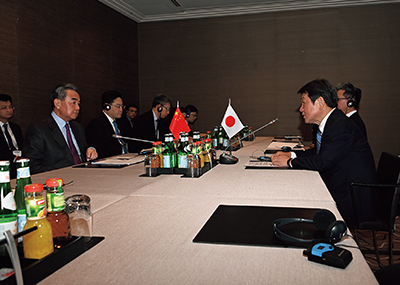 Japan-China Foreign Ministers' Meeting with Chinese State Councilor and Foreign Minister Wang Yi
Japan-China Foreign Ministers' Meeting with Chinese State Councilor and Foreign Minister Wang Yi(February 15, Munich, Germany)
On September 25, Prime Minister Suga and President Xi Jinping realized their first Japan-China Summit telephone call. Prime Minister Suga stated that a stable relationship between Japan and China is extremely important not only for the two countries, but also for the region and the international community, while conveying his hope that both countries would fulfill their responsibilities. The two leaders confirmed that their countries would continue to collaborate through various channels regarding COVID-19, and that they would continue to consult for the resumption of cross-border business travel as soon as possible. In addition to pending bilateral issues, the leaders discussed the challenges facing the region and the international community. Prime Minister Suga reiterated the situation in the East China Sea, including the waters around the Senkaku Islands, and stated that going forward he would like to discuss issues that are of great interest to the region and to the international community.
Although the travel of dignitaries between Japan and China was interrupted by the spread of COVID-19, State Councilor and Foreign Minister Wang Yi visited Japan on November 24 and the first high-level face-to-face meeting after the inauguration of the Suga administration was held. Foreign Minister Motegi had a total of more than three hours of Japan-China Foreign Ministers' meetings with State Councilor and Foreign Minister Wang Yi, including one-on-one talks, and they exchanged frank opinions on the direction of Japan-China relations, items of mutual concern in bilateral relations, regional conditions including North Korea, and issues facing the international community, such as climate change, trade and investment. During these meetings, Foreign Minister Motegi clearly conveyed Japan's position on the South China Sea, the situation in Hong Kong, the Xinjiang Uygur issue, etc. in addition to bilateral issues such as the situation in the East China Sea, including the waters around the Senkaku Islands, the import restrictions on Japanese food and the detentions of Japanese nationals. Foreign Minister Motegi strongly urged China to take concrete actions, and firmly conveyed Japan's position and idea that China should take responsibility for various issues in the region and in the international community. With regard to the Senkaku Islands in particular, Foreign Minister Motegi conveyed Japan's strong concerns over individual incidents and strongly urged China not to take such actions as China's longest-ever intrusion into Japan's territorial waters, China's navigation through the contiguous zone surrounding the Senkaku Islands and China's approaching to Japanese fishing vessels,.
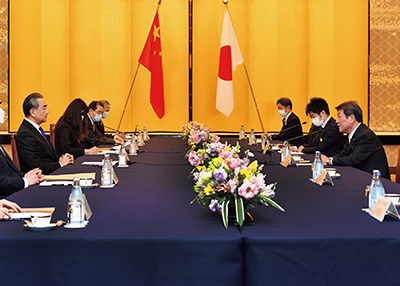 Japan-China Foreign Ministers' Meeting with Chinese State Councilor and Foreign Minister Wang Yi
Japan-China Foreign Ministers' Meeting with Chinese State Councilor and Foreign Minister Wang Yi(November 24, Tokyo)
On November 25, Prime Minister Suga received a courtesy call from State Councilor and Foreign Minister Wang Yi. Prime Minister Suga once again strongly urged China to take positive measures with regard to maritime and security issues such as in the East China Sea and in the waters surrounding the Senkaku Islands, the early removal of import restrictions on Japanese food, and, furthermore, the realization of the resumption of Japanese beef exports and exports of polished rice. Prime Minister Suga also conveyed Japan's concerns regarding the situation in Hong Kong and requested cooperation in dealing with North Korea, including on the abductions issue.
Based on a 2020 memorandum of understanding regarding the preparation of an annual plan for exchanges and cooperation, practical dialogue between the diplomatic authorities has been promoted, such as the Japan-China Strategic Dialogue (January) and the Japan-China Policy Planning Discussion (September, in an online format). Additionally, on December 14 there was a teleconference between Minister of Defense Kishi and State Councilor of China and Defense Minister Wei Fenghe, and on December 15 there was a teleconference between Speaker of the House of Representatives Oshima Tadamori and Chairman of the Standing Committee of the NPC Li Zhanshu.
Stable Japan-China relations are important for the peace, stability and prosperity of the region and the international community. Japan and China, working together as responsible powers on and contributing to a variety of issues in the region and international community, will lead to further strengthening of Japan-China relations. Japan will continue close cooperation at a high level, including between leaders, to build a stable relationship with China.
(B) Japan-China Economic Relations
Economic relations between Japan and China, including trade and investment, are very close. Therefore, the spread of COVID-19 in China and the two-and-a-half month lockdown of Wuhan had a major impact on the economies of Japan and China. In particular, many medical supplies and automobile parts are manufactured in China, which led to a shortage of medical supplies such as masks in Japan and reduced automobile production. Additionally, the global spread of COVID-19 severely restricted business travel between Japan and China.
Under such circumstances, economic activities between Japan and China have continued, and the total trade between Japan and China (excluding Hong Kong) amounted to about 304.8 billion US dollars in 2020 (0.3% increase year on year), and China has been the largest trading partner for Japan for 14 consecutive years. Moreover, according to Chinese statistics, Japan's direct investment in China increased to about 3.72 billion US dollars (2.0% decrease year on year, as estimated from officially published information on investment) in 2019. Figures for 2020 have yet to be announced as of March 2021. Japan ranks third in terms of the amount of direct investment to China (Singapore ranks first, the ROK second, and the U.S. fourth).
As for economic dialogue between Japan and China, Japan-China Economic Partnership consultation were held online in November, and there was an extensive exchange of opinions on future issues and cooperation between Japan and China, including the current state of the economy in Japan and China, travel and tourism, medicine and healthcare, the environment and energy conservation, and agricultural trade, as well as on multilateral issues and cooperation, including development, financial cooperation and debt issues, and trade and investment such as the WTO and RCEP. Japan raised to China the issues of ensuring the legitimate business activities of Japanese companies and a level-playing field in China, particularly with regard to protecting intellectual property, industrial subsidies and forced technology transfers, cyber data-related regulations, the Export Control Law, etc., and additionally once again strongly urged China to remove import restrictions on Japanese food.
At the Japan-China Foreign Ministers' Meeting held in Tokyo in November, with regard to economic areas, Japan and China agreed to promote cooperation together in fields where both sides have the same interests and direction, such as agricultural trade, travel and tourism, and the environment and energy conservation. Foreign Minister Motegi once again demanded that China protect the business activities of Japanese companies and ensure a level-playing field. Additionally, as a private-sector-level economic exchange, the Third Japan-China Business Leaders and Former High-Level Government Officials Dialogue (Japan-China CEO Summit) was held online in December.
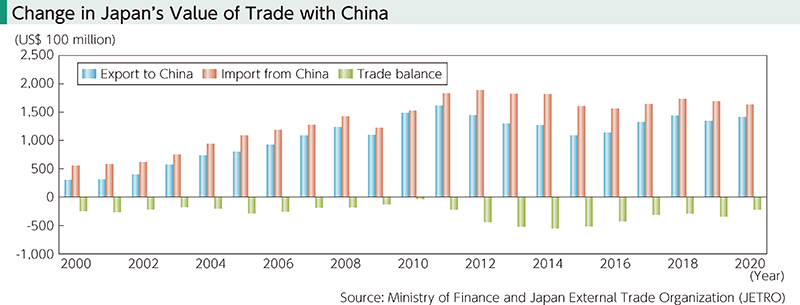
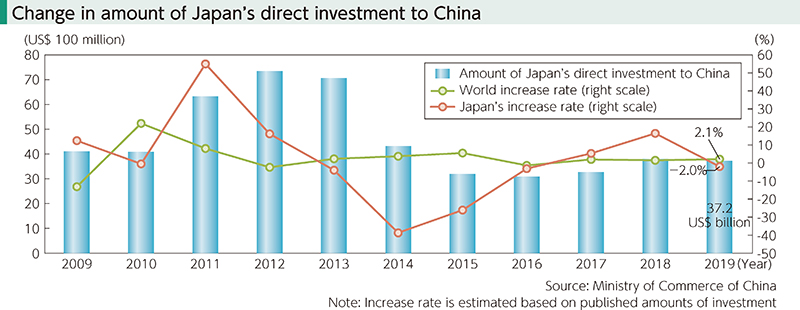
(C) Promotion of Mutual Understanding Between Japanese and Chinese People
(Current situation of people-to-people exchanges between Japan and China)
As COVID-19-related border measures, from February the Government of Japan designated Hubei Province, Zhejiang Province, and all of China as areas from which to refuse landings. From March, China also suspended visa exemption measures for Japan. As a result, travel between Japan and China dropped significantly, and the number of visitors to Japan from China went from a record high of 9.59 million in 2019 to approximately 1.07 million in 2020 (provisional value from the Japan National Tourism Organization (JNTO)). The Government of Japan lifted the landing refusal designation for China from November 1, and on November 30 began operation of “Business Track” and “Residence Track” travel programs (see the Opening Special Feature on page 2). It is expected that the resumption of travel will contribute to the revitalization of the Japanese and Chinese economies and promote mutual understanding.
(Japan-China youth exchange, etc.)
The year 2020 was designated as the “Japan-China Culture and Sports Exchange Promotion Year.” Japan solicited and verified events suitable for the purpose, and supported the strengthening of exchanges. Due to the impacts of COVID-19, related events were postponed or canceled in both Japan and China, but a total of 51 events were held after taking proper measures to prevent the spread of COVID-19, including holding them online. Japanese and Chinese youth who had participated last year in the “JENESYS2019” youth invitation program interacted again online and actively exchanged opinions on a variety of themes while enjoying conversation on their experiences at the program. Even amidst the COVID-19 epidemic, the youth exchanges between Japan and China continued through these efforts to explore new ways of conducting exchanges.
At the Japan-China Foreign Ministers' Meeting held in November, both Japan and China confirmed that they would cooperate for the success of the Olympic and Paralympic Games Tokyo 2020 in the summer of 2021 and then for the Olympic and Paralympic Games Beijing in the winter of 2022. Bearing in mind that 2022 is the 50th anniversary of the normalization of Japan-China relations, the promotion of exchanges between both countries was discussed, and it was confirmed that both countries would support youth exchanges for the development of bilateral relations over the medium to long term.
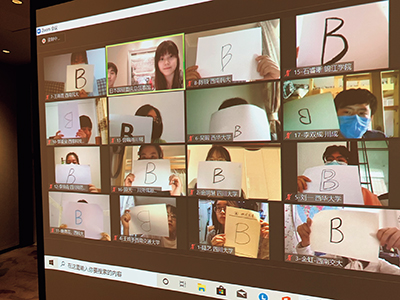 Online Japanese quiz tournament sponsored by the Consulate-General of Japan in Chongqing
Online Japanese quiz tournament sponsored by the Consulate-General of Japan in ChongqingFirst year Japanese language students from eight universities in Sichuan participated (June 14)
(D) Specific Pending Issues
(Situation Surrounding the East China Sea)
In the East China Sea, China Coast Guard vessels continue to intrude into the Japanese territorial sea around the Senkaku Islands. Also, the Chinese military has been rapidly expanding and increasing its activities in quality and quantity at sea and in the airspace over the East China Sea.
The Senkaku Islands are indisputably an inherent part of the territory of Japan in light of historical facts and based upon international law. Indeed, the Senkaku Islands are under the valid control of Japan. Thus, there exists no issue of territorial sovereignty to be resolved concerning the Senkaku Islands. From 1895, when the Senkaku Islands were incorporated into Japanese territory by lawful means under international law, until the 1970s, when the islands became the focus of attention after it was suggested that there might be oil reserves in the East China Sea, China had not raised any objections to Japan's sovereignty over the Senkaku Islands. Moreover, China has never explained why it had not expressed objections until then.22
China Coast Guard vessels continue to intrude into the Japanese territorial sea, recording 24 incidents during 2020 (the numbers were 32 in 2019, and 19 in 2018). In May, July, August, October, November and December, China Coast Guard vessels intruded into the Japanese territory of the Senkaku Islands, and incidents occurred in which the China Coast Guard vessels attempted to approach Japanese fishing boats that were navigating in the area. In the incident in October, the intrusion into Japan's territorial waters lasted for more than 57 hours, which is the longest amount of time to date. Additionally, from April to August, the number of days in which Chinese Coast Guard vessels consecutively navigated in the contiguous zone surrounding the Senkaku Islands reached a record high of 111 days, and the situation is becoming more severe, with the number of days in 2020 in which Chinese Coast Guard vessels navigated in the contiguous zone around the Senkaku Islands reaching a record high of 333 days. The activities of the China Coast Guard vessels, which make their own assertions in Japan's territorial waters around the Senkaku Islands, are in violation of international law to begin with, and the Government of Japan has repeatedly lodged strong protests and requested the withdrawal of Chinese vessels through diplomatic routes. With the determination to defend Japan's territory as well as territorial sea and airspace, Japan will continue to take a calm and resolute approach to the situation.
In June, the “Law of the People's Republic of China on the People's Armed Police Force,” which regulates the authority and duties of the People's Armed Police Force, was amended and “protection of interests at sea and law enforcement” was stipulated as a duty of the People's Armed Police Force. The Government of China is proceeding with the development of legal systems for securing Maritime Rights and Interests protection. In November a draft of the “Coast Guard Law of the People's Republic of China” was announced, which stipulated enforcement of the Maritime Rights and Interests Protection Act as a duty of the China Coast Guard, and it was enacted into law by the Standing Committee of the NPC in January 2021 and took effect in February 2021. The China Coast Guard Law contains provisions that have problems from the viewpoint of consistency with international law, such as ambiguities in the maritime areas where it can be applied and in the authority to use weapons. Japan believes that the China Coast Guard Law should not undermine the legitimate interests of relevant countries, including Japan, and will continue to convey these serious concerns to China.
In addition, Chinese naval vessels and aircraft have also been accelerating their activities in the sea and airspace around Japan. In January 2018, a submarine and ship navigated into Japan's contiguous zone around the Senkaku Islands. We expressed serious concerns, issued a serious protest, and strongly requested that it would not happen again, through diplomatic routes. Furthermore, aircraft activities also continue to be active, and the number of times the Air Self-Defense Force had to scramble jets in response to Chinese military aircraft since autumn 2012 has remained high. In response to these recent activities by the Chinese military, Japan has been raising the issues through diplomatic routes.
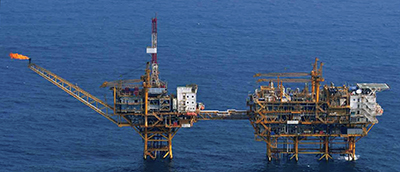
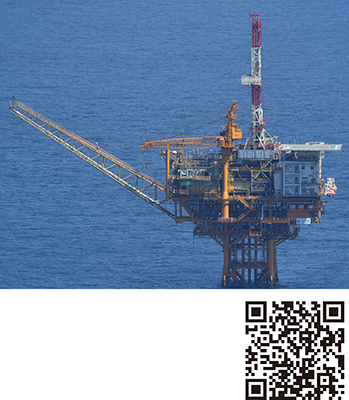 Chinese maritime structures confirmed to have been built near the geographical equidistance line
Chinese maritime structures confirmed to have been built near the geographical equidistance linebetween Japan and China (Photo: Ministry of Defense)
For details, see https://www.mofa.go.jp/a_o/c_m1/page3e_000356.html
Furthermore, China has been continuing its unilateral activities to develop natural resources while the Exclusive Economic Zone (EEZ) and the continental shelf between Japan and China in the East China Sea remain pending delimitation. The Government of Japan has confirmed 12 new structures built between June 2013 and May 2016, making it a total of 16 structures including those confirmed before then, on the Chinese side of the geographical equidistance line. Such unilateral development activities are extremely regrettable, and every time such moves by China are detected, Japan has strongly requested China to cease its unilateral development and to immediately resume negotiations on the implementation of the “2008 Agreement” regarding the cooperation between Japan and China on the development of natural resources in the East China Sea. At the summit meeting between Prime Minister Abe and President Xi Jinping in June 2019, the two leaders shared the view of promoting and implementing the “2008 Agreement” regarding resource development in order to achieve the goal of making the East China Sea a “Sea of Peace, Cooperation and Friendship.”
Moreover, in recent years numerous activities by China to carry out surveys in the waters around Japan, including the East China Sea, without obtaining Japan's approval, have been seen, and in order to deal with these concerns appropriately, both Japan and China have been promoting dialogue and exchanges between the authorities concerned. The Maritime and Aerial Communication Mechanism was concluded during the visit to Japan by Premier Li Keqiang in May 2018, and in June 2018 the defense authorities of Japan and China began operation of the Mechanism, which is highly significant for promoting mutual understanding between both countries and avoiding and preventing accidental collisions. Japan and China intend to accelerate their coordination toward the early establishment of a “hotline between the defense authorities of Japan and China.” Also, the Japan-China Maritime Search and Rescue (SAR) Agreement was signed during Prime Minister Abe's visit to China in October 2018, which creates a legal framework regarding Japan-China cooperation for the maritime search and rescue field, and is expected to enable smoother and more efficient search and rescue activities.
As Japan has stated on repeated occasions, including at Japan-China Summit Meetings, true improvement in Japan-China relations cannot be achieved without stability in the East China Sea. It is highly meaningful from the perspective of building trust and bolstering cooperation for diplomats from both countries to meet in person and exchange opinions frankly, such as at the 12th Japan-China High-Level Consultation on Maritime Affairs that was held in February 2021 or via other discussions between related authorities of both countries. The Government of Japan will strive to improve relations with China, while asserting Japan's position on individual issues through steady dialogue and continued bolstering of communication, in an effort to turn the East China Sea into the “Sea of Peace, Cooperation and Friendship.”
- 22 Ministry of Foreign Affairs website detailing the position of the Government of Japan on the Senkaku Islands:https://www.mofa.go.jp/region/asia-paci/senkaku/index.html

(Abandoned Chemical Weapons Issue)
The Government of Japan, in accordance with the Chemical Weapons Convention (CWC), has been working on the destruction of chemical weapons abandoned by Japan in China. In 2020, even amidst the impacts of COVID-19, on-site investigations, excavation and recovery operations were carried out in various locations across China, with destruction works carried out in Haerbaling District in Dunhua, Jilin Province and also in Harbin, Heilongjiang Province. Projects such as transporting shells were also conducted (as of December, approximately 58,000 abandoned chemical weapons have been destroyed).
(Cases of Detainment of Japanese Nationals)
In regard to cases of detainment of Japanese nationals, the Government of Japan has been working toward their early release on various occasions between Japan and China, including summit meetings. One Japanese national detained in September 2019 was released in November 2019. Since then, the Government of Japan has strongly requested, at all levels and at every occasion, the Government of China to ensure transparency in executing the law and the judicial process, properly safeguard the rights of Japanese nationals, ensure impartial justice, and provide humane treatment to detainees. At the Japan-China Foreign Ministers' Meeting in November 2020 between Foreign Minister Motegi and State Councilor and Foreign Minister Wang Yi, Foreign Minister Motegi strongly requested again that China take positive action.
(Japanese Food Import Restrictions Issue)
Regarding the import restrictions placed on food and agricultural products from Japan by the Government of China, Japan has taken every opportunity to urge China to remove as soon as possible the import restrictions placed on Japanese food products, including at the February Japan-China Foreign Ministers' Meeting, the July telephone call between the Japan and China Foreign Ministers, the November Japan-China Foreign Ministers' Meeting, and the courtesy call to Prime Minister Suga by State Councilor and Foreign Minister Wang Yi. In particular, at the Japan-China Foreign Ministers' Meeting in November, Japan strongly requested the early removal of import restrictions in light of the fact that March 2021 marks the 10th anniversary of the Great East Japan Earthquake. As a result of these efforts, it was agreed at the meeting with State Councilor and Foreign Minister Wang Yi to accelerate discussions to solve this issue, and the launch of the “Japan-China Agricultural and Fishery Products Trade Cooperation Mechanism” was agreed upon.
(Yamato Bank)
Numerous illegal operations by Chinese fishing vessels have been conducted in the waters around the Yamato Bank in the Sea of Japan. Japan has expressed concerns and has strongly and repeatedly urged China to take effective steps, including strengthening measures such as providing guidance to those engaged in fishing. At the November Japan-China Foreign Ministers' Meeting in November 2020, Foreign Minister Motegi also made strong requests to State Councilor and Foreign Minister Wang Yi.
(2) Taiwan
A Domestic Affairs
President Tsai Ing-wen, who was reelected in the January 2020 presidential election with the highest number of votes in history, was inaugurated for her second term on May 20 (Vice President is Lai Ching-te, former premier, Executive Yuan). At the inauguration ceremony, President Tsai Ing-wen thanked citizens for their cooperation in measures against COVID-19, and emphasized that since January 2020 Taiwan has surprised the international community with (1) its democratic elections and (2) the results from its COVID-19 measures. In fact, as COVID-19 measures, Taiwan rapidly implemented restrictions on entry from infected areas, and carried out a stable supply of masks by using the latest information processing techniques and IT technologies, and considerably suppressed infections, as compared with the international community. President Tsai Ing-wen also presented (1) industrial development, (2) social stability, (3) security, and (4) deepening democracy, as directions for the next four years.
In March, the Kuomintang, the largest opposition party, elected Johnny Chiang as Chairman of the Kuomintang in a by-election to replace former Chairman Wu Den-yih, who resigned after losing the presidential election.
Taiwan's economy is showing a recovery from the impacts of COVID-19 due to strong exports of 5G communications equipment, etc., and the real GDP growth rate in 2020 was 2.98% year on year (preliminary figure).
B Cross-strait Relations and Foreign Affairs
Since the 2016 inauguration of the Tsai Ing-wen administration, the direct cross-strait exchanges through the official route (Chinese side: Taiwan Affairs Office of State Council, the Association for Relations Across the Taiwan Strait, Taiwan side: Mainland Affairs Council, the Straits Exchange Foundation, Mainland Affairs Council) presumably have been discontinued. Under these circumstances, President Xi Jinping delivered an important speech in January 2019 in which he called for cross-strait unification under ‘One Country Two System' framework, but President Tsai Ing-wen declared that an absolute majority of Taiwanese people would not accept ‘One Country Two System' framework.
Taiwan was an observer at the World Health Organization (WHO) general assembly from 2009 to 2016, but has not been able to participate since 2017, and has also not been able to participate in the general assembly of the International Civil Aviation Organization (ICAO) and other international organizations. Furthermore, Taiwan is only able to participate in some technical and expert meetings (Taiwan participated in WHO expert meetings on COVID-19 in 2020).
Japan has traditionally considered that there should be no geographical gap in responding to international health issues. Japan also recognizes that it is important to widely share the information and knowledge of each country and region in a free, transparent and prompt manner, particularly for diseases such as COVID-19 that have an enormous impact on the entire world. From this perspective, Japan has consistently supported Taiwan's participation as an observer to the WHO General Assembly.
Following São Tomé and Príncipe in 2016, Panama in 2017, Dominican Republic, Burkina Faso, and El Salvador in 2018, and the Solomon Islands and Kiribati in September 2019, who have severed diplomatic relations with Taiwan and established or re-established diplomatic relations with China, there are a total of 15 countries who have diplomatic relations with Taiwan (seven countries have cut diplomatic relations with Taiwan since the inauguration of the Tsai administration).
C Japan-Taiwan Relationship
For Japan, Taiwan is an extremely crucial partner and an important friend, with which it shares fundamental values such as freedom, democracy, basic human rights and the rule of law, and enjoys close economic relations and people-to-people exchanges. The relationship between Japan and Taiwan is maintained on the basis of working relations at the non-governmental level in accordance with the 1972 Joint Communiqué between Japan and China. The sentiments of Japanese and Taiwanese citizens toward each other are generally favorable. In a survey conducted in February 2019 by the Japan-Taiwan Exchange Association, a private Japanese agency, 70% of Taiwanese respondents said they “felt close to Japan” or “relatively felt close to Japan.” Reflecting such favorable sentiments toward Japan, the number of visitors to Japan from Taiwan in 2019 exceeded 4.89 million, marking a record high and demonstrating close people-to-people exchanges, but visitors significantly decreased in 2020 due to the impacts of COVID-19.
In July, former President Lee Teng-hui passed away. He made great contributions to the promotion of friendship between Japan and Taiwan and made extremely important contributions to the consolidation of fundamental values in Taiwan such as freedom and democracy. In response, former Prime Minister Mori Yoshiro led a delegation to express condolences, and visited Taiwan twice to attend the funeral ceremonies.
Taiwan has continued to impose import restrictions on Japanese food products after the Great East Japan Earthquake, and Japan has repeatedly strongly requested the removal and relaxation of the restrictions on the basis of scientific evidence.
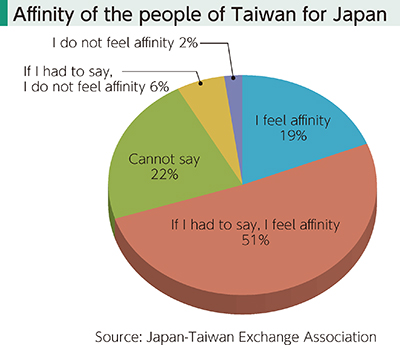
(3) Mongolia
A Domestic Affairs
In May an amended constitution came into effect, which ensures the maintenance and continuation of parliamentary democracy, strengthens the authority of the Prime Minister and Cabinet, amends the term and mandate of the President, and strengthens guarantees of judicial independence.
In the general election held in June for the 8th State Great Khural (unicameral system, four-year term of office, 76 members), the ruling Mongolian People's Party overwhelmingly won. In July it was decided that Prime Minister U. Khurelsukh would continue in his role, and a new Cabinet was inaugurated. Prime Minister Khurelsukh, in response to the worldwide spread of COVID-19, introduced strict immigration controls and epidemic prevention measures at an early stage to contain domestic outbreaks (the first case of community transmission was confirmed in November).
On the other hand, the COVID-19 epidemic directly impacted the domestic economy. In November, government economic statistics recorded a 14.3% decrease in tax revenue, a 2.8% decrease in exports, a 12.5% decrease in imports, and a 12.8% decrease in mining production compared to the same period in the previous year. The Government of Mongolia is implementing large-scale emergency economic measures.
B Japan-Mongolia Relations
2020 was a year in which Japan and Mongolia confirmed that they would further strengthen cooperation to strengthen their “Strategic Partnership,” with Mongolia as an important regional partner sharing universal values with Japan.
In May while the travel of dignitaries was suspended due to the COVID-19 epidemic, Foreign Minister Motegi held a telephone call with Minister for Foreign Affairs D. Tsogtbaatar. In October, shortly after the inauguration of the Suga administration, Foreign Minister Motegi visited Mongolia, held a meeting with new Minister for Foreign Affairs N. Enkhtaivan, and paid a courtesy call to President Kh. Battulga and Prime Minister U. Khurelsukh. The visit was greatly welcomed as Mongolia's first dignitary visit from a “third neighbor country (note: major countries, other than the neighboring countries of China and Russia, with which Mongolia pursues to strengthen relationships and cooperation)” after the spread of COVID-19, and Mongolia thanked Japan for its consistent support for Mongolia. During the visit, Japan and Mongolia agreed to further expand their “Strategic Partnership,” looked forward to celebrating the 50th anniversary of the establishment of diplomatic relations in 2022, agreed to newly develop a “Mid-term Action Plan,” and agreed on a policy of strengthening efforts toward the realization of a “Free and Open Indo-Pacific.” In addition, cooperation for the smooth opening and operation of the New Ulaanbaatar International Airport was confirmed.
As strategic partners sharing universal values, Japan and Mongolia will deepen exchanges and relationships in all fields and will further strengthen cooperation in regional and international fields.
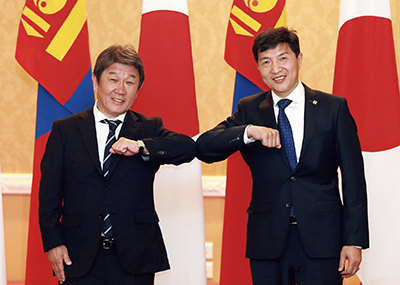 Japan-Mongolia Foreign Ministers' Meeting with Minister for Foreign Affairs N. Enkhtaivan
Japan-Mongolia Foreign Ministers' Meeting with Minister for Foreign Affairs N. Enkhtaivan(October 9, Ulaanbaatar, Mongolia)
